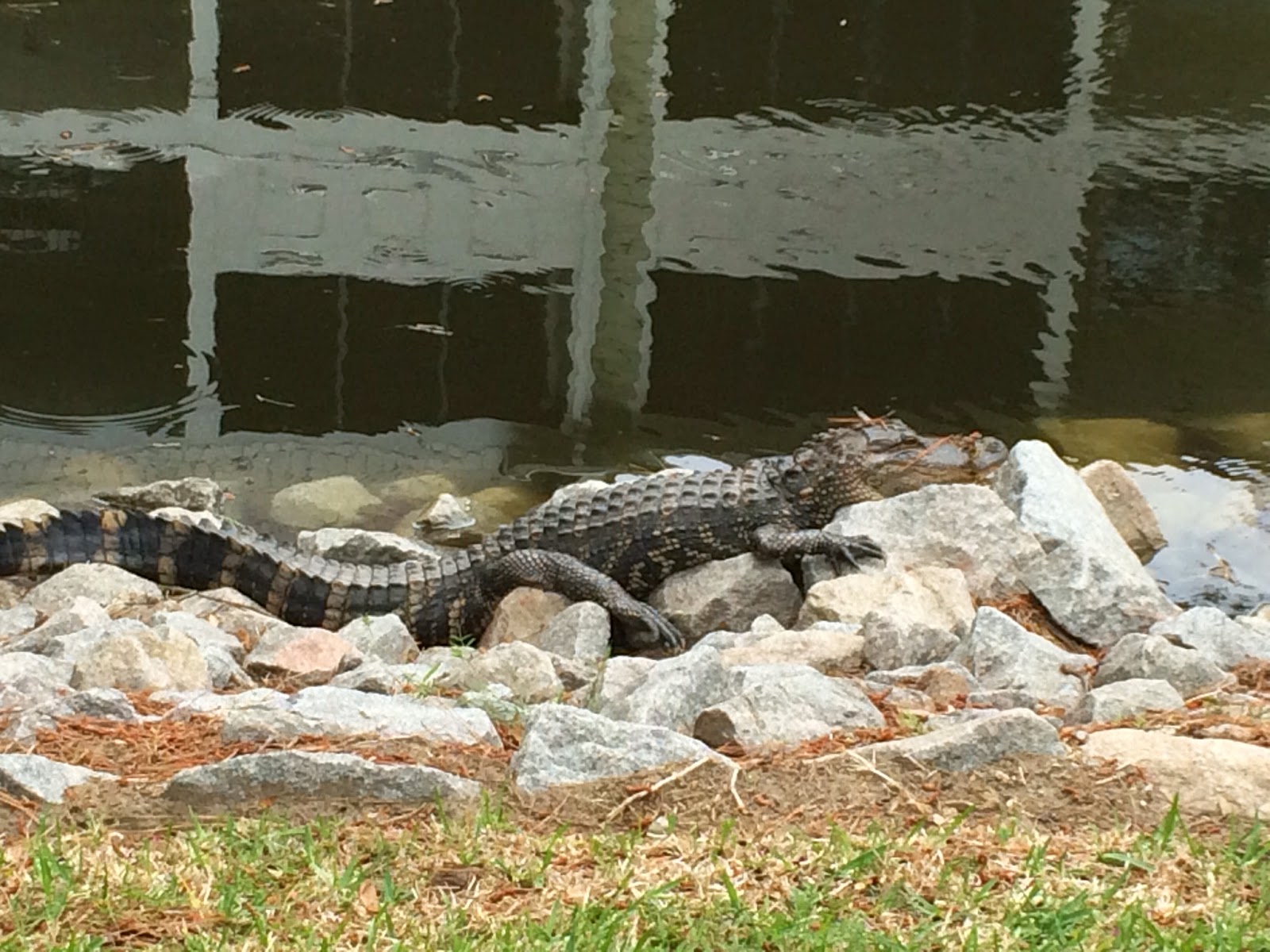In the spring, male alligators move around significantly, especially at night, looking for mates, so you might see some alligator movement right now between our ponds. You may even be lucky enough to hear loud bass croaking sounds (similar to the frog croaking) as the alligators are mating.
The first thing to remember is that we are the invaders. Several decades ago, alligators were on the endangered species list. Through many efforts, their populations have recovered to the point, they are no longer protected. However, this does not mean we can destroy all alligators that enter our property. Yes, destroy is the correct term, as alligators that are removed must be killed. They cannot be relocated.
A long alligator is an old alligator. A twelve foot alligator can be anywhere from 50-80 years old. So if we have a blanket rule that all "long" alligators are removed, then all of the mature alligators are being killed. While a few might become "grumpy old men" and aggressive towards humans, the majority are mellow fellows who are basking in the warm sun just like the girls at the pool. (Alligators are not too worried about skin cancer.)
What defines a nuisance alligator? A nuisance alligator is at least 4-6 feet in length and is believed to pose a threat to people, pets or property. This definition is quite vague as to what defines a "threat". The HOA relies on an alligator management and nuisance removal company to evaluate the animal to determine if the animal shows any signs of unprovoked aggression towards humans as a sign of threat. If the animal is determined to be aggressive, it is removed from the property.
Isn't every alligator aggressive? Alligators are territorial and will respond to a perceived threat. Provoking and/or feeding an alligator is illegal, as these activities can cause the animal to become more aggressive towards humans. (i.e. If you give a mouse a cookie, it will want a glass of milk...)
What is normal alligator behavior? Alligators routinely lay on the banks of retention ponds to warm their bodies (sometimes up to several feet onto the grass surrounding the pond). Often, they will have their mouth open to cool their overheated bodies (think of a dog panting). This is not a sign of aggression.
Why does the animal just lay there or hiss if I approach it? First, why are you approaching the alligator? This is considered provoking the alligator and is illegal. As to the alligator's reaction, hissing is his courteous warning that you are too close to his territory and to please leave. (To return to a dog analogy, its barking or growling at someone who gets too close to his home or owner.) The preferred natural response is for the animal to retreat to the pond. Another perfectly normal response is for the alligator to ignore you and remain where he is. This may be due to the animal not perceiving the approach as a threat. However, this can also be due to their natural tendency to freeze when frightened (deer in the headlights) and can take upwards of 30 minutes to be able to move again. It also has difficulty moving soon after a meal, while it is digesting. On the other hand, an aggressive response would be for the animal to move straight (and possibly quickly) towards you.
How do I safely cohabitate with the alligators? Assume that any pond in the low country has an alligator in it. Patrol your pets and children around ponds, and do not allow them to approach the water's edge. Alligators kill by drowning their prey. While any alligator can be euthanized for being a nuisance, only gators greater than 6 feet long really have the physical capabilities of taking down a larger animal (dog, etc). Unfortunately, relocating an alligator is not an acceptable option because they return directly to their previous location as soon as they are released.
The SC Parks has a great article describing the facts and fictions of alligators.
Below is the official protocol for dealing with alligators in within the community:
Retreat at Riverland HOA protocol for dealing with alligators
If
the Board determines that an alligator might be aggressive,
arrangements will be made with a licensed nuisance wildlife vendor to
perform an assessment. Expenses to perform the
assessment will be paid for by the Retreat HOA and the results of the
testing will be shared with any concerned owners.
Based
on the assessment of the licensed nuisance wildlife vendor the
alligator will either be left alone or be removed from the property and
be destroyed. If the nuisance wildlife
vendor makes a determination that the alligator shows no signs of
aggression it will remain on the property. On the other hand if the
nuisance wildlife vendor makes a determination that the alligator shows
signs of aggression it will be removed from the property
immediately. Expenses to remove and destroy the alligator will be paid
for by the Retreat HOA.
If
a resident insists that an alligator be tested again for aggressive
behavior the service fees for obtaining a professional opinion will be
for his/her own account. If the repeat
assessment determines that the alligator is aggressive the resident
will be refunded for the service fees charged to his/her account.
A decision whether to remove an alligator from the property resides exclusively with the Board.
If
an owner/resident/guest is found provoking or feeding an alligator on
the property there will be an automatic $150 fine, as this could lead to
the alligator becoming aggressive.

No comments:
Post a Comment